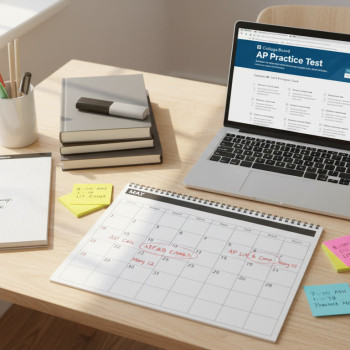Why WhatsApp and Parent Groups Matter for AP Success
AP season can feel like a whirlwind—schedules, practice tests, supplementary readings, and the emotional ups and downs of high-stakes prep. Parents, guardians, and caregivers want to help, but the logistics can be overwhelming. That’s where WhatsApp and similar parent groups shine: they’re low-friction, instant, and human. Used well, they become a gentle scaffolding around your student’s study life—sharing resources, coordinating study sessions, and offering moral support without turning into a noisy, stressful echo chamber.

What a Healthy Parent Group Looks Like
Not every group will be perfect, but effective AP-focused parent groups have a few things in common:
- Clear purpose: Is the channel for resource sharing, scheduling proctored tests, or emotional support?
- Respectful boundaries: Members avoid sharing exam answers, respect privacy, and keep tone constructive.
- Organized threads or subgroups: Use labels, pinned messages, or separate groups for different classes or tasks.
- Actionable posts: When someone shares a resource, a one-line summary of why it helps saves everyone time.
Getting Started: From Chaos to a Calm, Organized Group
Starting a parent group for AP coordination is easy—forming one that’s useful takes a little thought. Here’s a step-by-step plan you can adopt the first time your group forms or when you want to improve an existing chat.
Step 1 — Define the Group’s Purpose and Rules
Begin with a short, pinned description that answers these questions:
- Which AP subjects are we supporting?
- What’s allowed—notes, practice tests, volunteer proctoring offers?
- What’s not allowed—sharing of live exam content, pressuring teachers, or medical details?
Keep it friendly and brief; a one-paragraph charter and one-line rules work wonders.
Step 2 — Create Logical Subgroups
One large chat can quickly become cluttered. Consider subgroups for:
- Each AP subject (AP Calculus, AP English, AP Biology, etc.)
- Logistics (test-day ride shares, proctoring coordination)
- Mental health and motivation (encouraging notes, stress-management tips)
This keeps subject-specific conversations from getting lost under logistics or motivational messages.
Step 3 — Appoint Moderators and Assign Roles
Volunteers make everything run more smoothly. Typical roles include:
- Moderator: enforces rules, pins important messages
- Resource Curator: compiles shared materials into a single post weekly
- Logistics Coordinator: manages test-day sign-ups and carpools
Best Practices for Sharing AP Resources
Not all resources are created equal. The goal is to share high-quality, actionable materials without drowning the group in links. Here are practical tips that keep the group lean and useful.
Share with Context
When sharing a link or file, add a short note: who it’s for, the format (video/worksheet/quiz), and how much time it takes. Example: “AP Bio—10-minute video on cell respiration; great for a quick review before labs.” This turns random links into helpful recommendations.
Use a Weekly Digest
Rather than posting dozens of messages daily, compile a weekly digest: top 3 resources per subject, upcoming deadlines, and volunteer needs. A single summary message reduces noise and becomes a go-to reference.
Quality Checklist
Before recommending a resource, ask:
- Is it aligned with the AP Course and Exam Description?
- Is the level appropriate (introductory review vs. advanced practice)?
- Is it clearly explained and time-efficient?
Sample Table: How to Evaluate and Categorize Resources
| Resource | Type | Best Used For | Estimated Time | Rating (1–5) |
|---|---|---|---|---|
| Practice FRQ Set — Unit 2 | Worksheet | Timed exam practice | 45–60 mins | 4 |
| Concise Review Video — Topic X | Video | Quick concept recap | 8–12 mins | 5 |
| Interactive Quiz | Quiz | Formative assessment | 10–20 mins | 3 |
Coordinating Study Groups and Proctored Practice Tests
Study groups and practice tests are among the most impactful activities parents can help coordinate. When students practice under realistic conditions and get peer feedback, they internalize material faster and build confidence.
Organizing Study Sessions
Use the group chat to:
- Propose multiple time slots and pick the one that fits the most students.
- Assign roles—presenter, question writer, timer—to encourage active participation.
- Keep sessions short and focused: 60–90 minutes with clear objectives.
Setting Up Proctored Practice Tests
Practice tests mimic the pressure of exam day. Parents can help by:
- Signing up as proctors for timed practice sessions.
- Reserving quiet spaces at home or in community rooms.
- Providing simple snacks and gentle encouragement afterward.
When parents offer support but let teachers or students handle content decisions, the environment remains empowering rather than overbearing.
Balancing Help with Student Autonomy
One delicate line parent groups must walk is between facilitating and micromanaging. The goal: empower students to take ownership while using the group as a safety net.
Use Questions That Encourage Independence
Instead of asking “Did you finish this chapter?”, try “What’s one concept you’d like to solidify this week?” These prompts push students to self-assess and prioritize.
When to Step Back
If students signal they want less parental involvement—fewer messages, more private planning—honor that. Periodic check-ins are great, but be sensitive to their need for agency, especially as AP tests approach.
Managing Privacy, Etiquette, and Sensitive Content
WhatsApp groups are convenient but come with privacy considerations. Make sure your group has a shared understanding of what’s appropriate to share.
Privacy Best Practices
- Don’t post identifiable student work or photos without consent.
- Use private messages for detailed, personal feedback.
- Collect emergency contact info privately, not in the group chat.
Healthy Etiquette
Encourage members to:
- Use subject headers in messages: e.g., [AP Calc] or [Logistics]
- React with emojis for quick acknowledgment instead of long chains of messages
- Keep tone constructive—replace panic posts with solutions or calming suggestions
Dealing with Misinformation and Exam Anxiety
Every parent group will see its share of myths and anxieties—about scoring curves, what to bring on exam day, or how sudden curriculum changes will impact readiness. Here are ways to keep the group grounded.
Designate a Fact-Checker
Elect someone (or rotate the role) to verify any factual claims before they’re amplified in the group. Verification can be as simple as double-checking with a teacher or confirming exam-day logistics through official channels.
Normalize Anxiety and Offer Practical Tools
Share evidence-based anxiety-reduction techniques: short breathing exercises, timed practice under quiet conditions, sleep hygiene tips, and focused review checklists. Small, repeatable habits often do more than grand gestures the week before the exam.
Sample Weekly Schedule for an AP Student (Shared in Group)
Parents can model a realistic weekly plan that balances content review, practice, and downtime. Here’s a sample that fits into a busy school week.
| Day | Focus | Time Commitment | Why It Helps |
|---|---|---|---|
| Monday | Topic Review + 20-min Quiz | 60 mins | Reinforce content after class |
| Wednesday | Practice Problems (timed) | 45–60 mins | Build exam pacing |
| Friday | Group Study or Tutor Session | 60–90 mins | Peer explanation and feedback |
| Sunday | Full-Length Practice Section | 90–120 mins | Simulate test conditions |
How Parents Can Support Without Taking Over
This section helps translate good intentions into practical support. Small gestures add up: consistent breakfasts, a quiet home during practice tests, or a short note of encouragement can shift a student’s stress curve significantly.
Practical, High-Impact Actions
- Coordinate carpools for early morning practice tests so students aren’t rushed.
- Help maintain a predictable household routine in the weeks leading up to exams.
- Offer to check logistics—test dates, materials needed, and start times—so students focus on studying.
When to Bring in External Help
If gaps persist—like chronic score stagnation or overwhelm—consider personalized tutoring. Sparkl’s personalized tutoring, for example, offers 1-on-1 guidance, tailored study plans, expert tutors, and AI-driven insights to help target weak areas without overwhelming the student. When mentioned naturally in group chats, this becomes one of several support options rather than a default solution.
Template Messages You Can Use in the Group
Here are ready-to-send messages that keep communication clear and kind.
- Resource Share: “[AP Chem] Short video on equilibrium—10 mins. Covers Le Chatelier examples and has 3 practice questions at the end.”
- Volunteer Request: “Can someone proctor a timed APUSH practice this Saturday at 9 AM? We have room for 6 students.”
- Weekly Digest Intro: “Weekly AP Digest — top resources, upcoming deadlines, and a quick reminder about test-day logistics.”
- Encouragement Note: “Midterms are tough—small progress counts. If your student wants a 20-minute check-in on scheduling, I’m happy to help.”
Common Pitfalls and How to Avoid Them
Parent groups can become well-meaning but counterproductive if certain pitfalls aren’t addressed. Here are common problems and practical fixes.
Pitfall: Information Overload
Fix: Limit posts to essentials, use digests, and designate a resource curator.
Pitfall: Score Obsession
Fix: Keep the focus on progress and skills. Celebrate effort and practical wins, not just final numbers.
Pitfall: Unsolicited Advice Overload
Fix: Encourage people to preface suggestions with “If helpful…” and keep feedback specific and actionable.
Measuring Success: Simple Metrics for the Group
How do you know your group is helping? Choose a few simple, humane metrics:
- Student engagement in study sessions (how many attend regularly?)
- Number of proctored practice tests held each month
- Student-reported confidence changes in short polls
These aren’t about policing; they’re about making adjustments. If attendance drops, ask why. If anxiety spikes, share more calming strategies and shorter practice formats.
Closing Thoughts: Community with Intention
WhatsApp and parent groups can become a powerful, human-centered support system for AP students when they’re organized, respectful, and focused on empowerment. They shouldn’t replace teacher guidance or a student’s personal responsibility, but they can amplify both—by making logistics easier, sharing high-quality resources, and creating a consistent rhythm around preparation.
Keep the tone compassionate, the rules simple, and the focus on actionable resources. Celebrate the small wins—the completed practice test, the concept finally understood, the calm morning before an exam. When parents create a supportive, well-organized environment, students gain more than improved scores: they gain confidence and habits that last well beyond AP exams.

If your group is just getting started: pick one clear purpose, appoint one moderator, and plan one proctored practice test this month. Small steps build momentum—and before you know it, your group will be a steady, reassuring presence on the AP journey.

















No Comments
Leave a comment Cancel